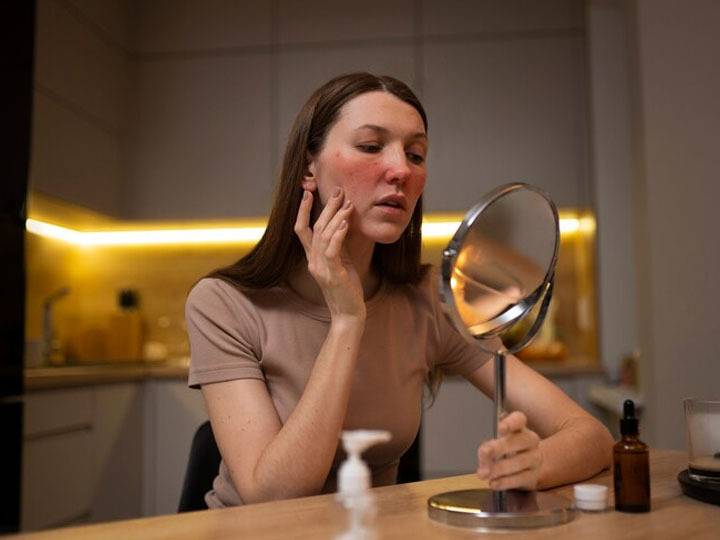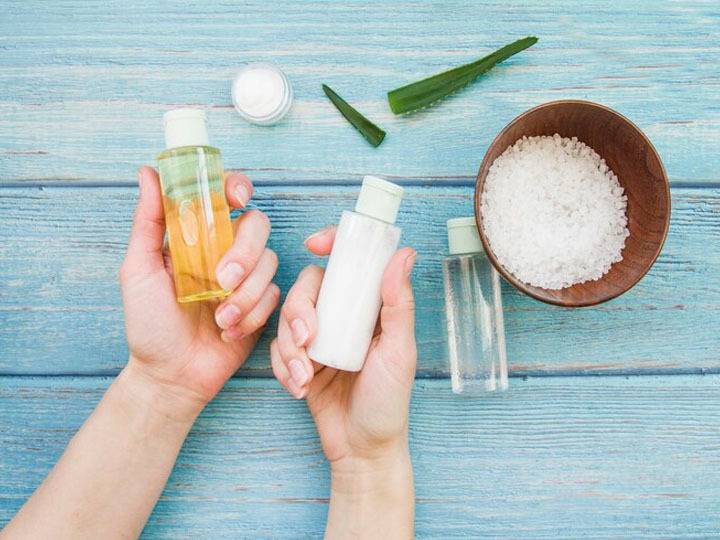If you use many products for your skin, you might wonder, ‘Why do I still get spots?’ It can be really annoying when you spend time washing your face and using creams every day, but you don’t see any changes. It’s crucial to understand that your current daily habits may not be suitable for your skincare routine. Sometimes, it could even be making your spots worse.
“Taking care of your skin isn’t the same as treating acne,” says Dr. Heidi Waldorf from Waldorf Dermatology Aesthetics. “Some people believe they have treated their acne just by getting facials without consulting a dermatologist. Acne is a problem that needs proper treatment to reduce existing pimples and prevent new ones from appearing.
“Sometimes, you need to look beyond your usual routine to find habits or health issues causing acne,” advises Dr. Michele Farber from Schweiger Dermatology Group in NYC. “To understand what is causing your skin to break out, it’s best to consult your dermatologist. They can adjust your routine, discuss habits that might need changing, and even suggest treatments like cortisone injections or peels to kick-start your skincare routine. Here are a few reasons experts say acne might stick around, even if you’re trying to get rid of it.
Your Hormones Are Out of Whack
“If you always have acne, it could be useful to get some blood tests to check what’s happening inside your body. According to Kristina Goldenberg from Goldenberg Dermatology in NYC, “Just having a good skincare routine might not be sufficient to manage acne if a woman’s hormone levels are not normal. Checking levels of different hormones can help find out why.

If you do blood tests, they might show if there’s another issue causing your acne, like polycystic ovarian syndrome. According to Dr. Franziska Ringpfeil from Ringpfeil Advanced Dermatology, acne that doesn’t go away with regular treatment could be due to conditions like polycystic ovarian syndrome, hidradenitis suppurativa (a skin condition causing lumps under the skin), or an overactive pituitary gland. If this is true, your doctor can prescribe medication to balance your hormones and decrease your acne.
You’re Accidentally Consuming Steroids
What you eat for breakfast every morning can also make a difference. So, if you have the same food or drink every day, it’s good to think about how it affects your body.

Consider protein shakes, for instance. It’s crucial to know that some protein shakes have a little bit of steroids that could lead to breakouts. This might be a reason why breakouts keep happening,” says Goldenberg. “The tricky part is, these amounts are tiny, and they might not be listed on labels. So, I usually advise my patients to stop having protein shakes if acne keeps coming back.” Making some changes in what you eat and choosing more natural foods and drinks might make a big difference.
Your Makeup Brushes Are Dirty
When was the last time you washed your makeup brushes? If you don’t clean them, they can have bacteria that might make you get spots,” says Farber. To stop these germs from getting on your face, try to wash brushes for concealer and foundation at least once a week. You might see your skin getting better.

You’re Using the wrong makeup
If you use makeup every day, it might help to try different brands, especially if you always have spots. Some makeup without minerals can have lots of ingredients with strong chemicals, colors, smells, and preservatives. These things can irritate many people,” explains RealSelf contributor Dr. Joel Schlessinger. “Non-mineral types are usually liquid and more likely to go into the skin, blocking pores and making spots worse. They often have oil too, which can upset the skin’s natural balance.

A lot of people notice their skin getting better when they start using mineral makeup. Mineral makeup comes from natural minerals found in the earth. It’s meant to stay on the skin’s surface, like a natural shield against things in the environment,” explains Schlessinger. “Since it stays on the skin’s surface, mineral makeup doesn’t block pores, which is good for people who often get spots.
Your Cell Phone is to Blame
If you’re like most people, you probably spend a lot of time with your phone near your cheek. If you often get spots, doing this can make the oil on your skin worse.

It’s not a surprise that our smartphones can be very dirty,” says Schlessinger. “Scientists say the average phone could have more than 25,000 germs and bacteria in each square inch… We touch things like doorknobs, money, and other things with germs, and then we touch our phones. When you put your phone on your cheek, all those germs can go into your pores and cause spots and redness.” To lessen how much your phone touches your skin, try using a headset or headphones for calls. You can also use a cleaning wipe on your phone before putting it near your face.
Your Skin Routine is too Complex
Having a complicated skincare routine might not be the best approach to achieving clear skin, even though you might believe it is,” says Farber. “Using lots of products can make your skin irritated and dry. Putting lots of medication on your spots won’t really help. It’s important to use acne medicine carefully, just as your dermatologist tells you.

The same goes for your cleansers. Using certain soaps, scrubs, and detergents too much can be a reason why your spots keep coming back or staying,” says Dr. Mirela Mitan, founder and CEO of MMXV Infinitude Skincare. “Washing removes the oil on the surface, not the sebum in the follicle where the problem is. This can actually make acne worse. Exfoliating too often removes the skin’s natural barrier. If your skin is sensitive, it’s best to exfoliate only once a week.
In Conclusion
Achieving clear skin goes beyond a good skincare routine. If you’re continuing to break out despite your efforts, it’s crucial to consider common mistakes in your habits. Various factors, including hormonal imbalances, unintentional steroid consumption, dirty makeup brushes, and the use of the wrong makeup, can contribute to persistent acne. Additionally, the hygiene of your phone and the complexity of your skincare routine may also play a role. By addressing these issues and consulting with a dermatologist, you can tailor your approach, resulting in better skin health and an improved skincare outcome.






